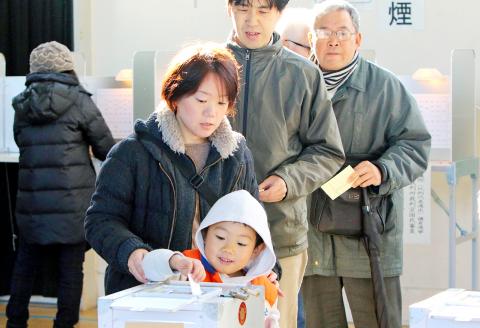Japanese Prime Minister Shinzo Abe won comfortable re-election yesterday in a snap poll he had billed as a referendum on his economic policies after early success faded into a recession.
However, a low turnout from unenthusiastic voters beset by heavy snowfall across much of the nation could cast doubt on the endorsement he will claim for “Abenomics” — his signature plan to resurrect the country’s flaccid economy.
Media exit polls shortly after voting finished showed his ruling Liberal Democratic Party of Japan (LDP) and its junior partner, Komeito, had swept the ballot, with an unassailable two-thirds majority in the lower house of parliament that will give them the power to override the upper house.

Photo: AFP
TV Asahi said the pairing had won 333 of the 475 seats, while TBS put the figure at 328.
The online version of the Nikkei Shimbun newspaper said the LDP alone had won between 290 and 310 seats, and was “on course to secure the two thirds [317 seats] in the chamber with coalition partner Komeito.”
“This victory will enhance Abe’s political capital and allow him to tackle tough issues more comfortably,” University of Niigata Prefecture politics professor Yoshinobu Yamamoto said.
Abe, 60, was only halfway through his four-year term when he called the vote last month.
Abe has been criticized for not being bold enough in taking on the vested interests that are the real key to reversing nearly two decades of economic underperformance.
His fresh four-year mandate may stiffen his resolve for economic reforms and see off opposition from within his ill-disciplined LDP, a party given to bouts of regicide.
However, with only 34.98 percent of voters casting ballots by 6pm, there might be questions over whether this really is an endorsement, or just the default reaction of an electorate numbed by a lack of viable alternatives.
The turnout at 6pm was down 6.79 points from the 2012 election.
However, early voting — which was completed by Saturday — was up by almost a tenth from the previous poll, to approximately 13 million ballots, according to the government.
Japanese Chief Cabinet Secretary Yoshihide Suga dismissed quibbles over the low turnout.
“We don’t know which party will benefit from a low turnout rate, so we think we received [a mandate from voters],” he told TBS.
“The prime minister feels very strongly about pulling Japan out of deflation and revitalizing the Japanese economy,” he said.
Voters polled in the run up to the ballot were uninspired by the choices on offer.
Only two-thirds of respondents told Kyodo News last week that they were interested in the election.
Many Japanese have been left bitterly disappointed by three years under the Democratic Party of Japan from 2009, which saw three emasculated prime ministers and a series of policy flops.

CHAOS: Iranians took to the streets playing celebratory music after reports of Khamenei’s death on Saturday, while mourners also gathered in Tehran yesterday Iranian Supreme Leader Ayatollah Ali Khamenei was killed in a major attack on Iran launched by Israel and the US, throwing the future of the Islamic republic into doubt and raising the risk of regional instability. Iranian state television and the state-run IRNA news agency announced the 86-year-old’s death early yesterday. US President Donald Trump said it gave Iranians their “greatest chance” to “take back” their country. The announcements came after a joint US and Israeli aerial bombardment that targeted Iranian military and governmental sites. Trump said the “heavy and pinpoint bombing” would continue through the week or as long

TRUST: The KMT said it respected the US’ timing and considerations, and hoped it would continue to honor its commitments to helping Taiwan bolster its defenses and deterrence US President Donald Trump is delaying a multibillion-dollar arms sale to Taiwan to ensure his visit to Beijing is successful, a New York Times report said. The weapons sales package has stalled in the US Department of State, the report said, citing US officials it did not identify. The White House has told agencies not to push forward ahead of Trump’s meeting with Chinese President Xi Jinping (習近平), it said. The two last month held a phone call to discuss trade and geopolitical flashpoints ahead of the summit. Xi raised the Taiwan issue and urged the US to handle arms sales to

BIG SPENDERS: Foreign investors bought the most Taiwan equities since 2005, signaling confidence that an AI boom would continue to benefit chipmakers Taiwan Semiconductor Manufacturing Co’s (TSMC, 台積電) market capitalization swelled to US$2 trillion for the first time following a 4.25 percent rally in its American depositary receipts (ADR) overnight, putting the world’s biggest contract chipmaker sixth on the list of the world’s biggest companies by market capitalization, just behind Amazon.com Inc. The site CompaniesMarketcap.com ranked TSMC ahead of Saudi Aramco and Meta Platforms Inc. The Taiwanese company’s ADRs on Tuesday surged to US$385.75 on the New York Stock Exchange, as strong demand for artificial intelligence (AI) applications led to chip supply constraints and boost revenue growth to record-breaking levels. Each TSMC ADR represents

State-run CPC Corp, Taiwan (CPC, 台灣中油) yesterday said that it had confirmed on Saturday night with its liquefied natural gas (LNG) and crude oil suppliers that shipments are proceeding as scheduled and that domestic supplies remain unaffected. The CPC yesterday announced the gasoline and diesel prices will rise by NT$0.2 and NT$0.4 per liter, respectively, starting Monday, citing Middle East tensions and blizzards in the eastern United States. CPC also iterated it has been reducing the proportion of crude oil imports from the Middle East and diversifying its supply sources in the past few years in response to geopolitical risks, expanding